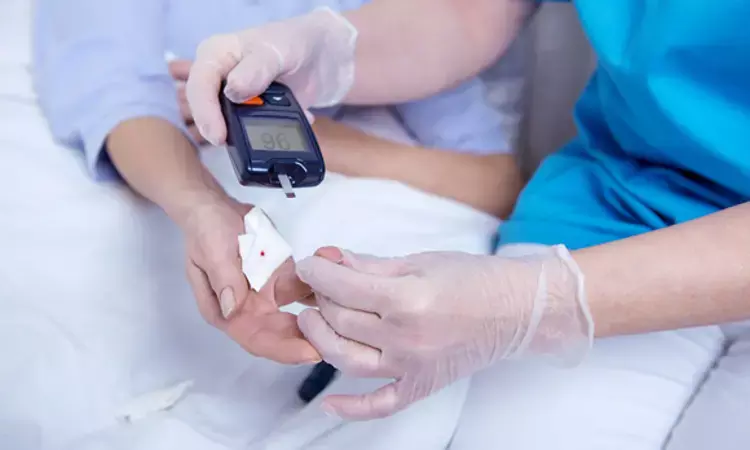- Home
- Medical news & Guidelines
- Anesthesiology
- Cardiology and CTVS
- Critical Care
- Dentistry
- Dermatology
- Diabetes and Endocrinology
- ENT
- Gastroenterology
- Medicine
- Nephrology
- Neurology
- Obstretics-Gynaecology
- Oncology
- Ophthalmology
- Orthopaedics
- Pediatrics-Neonatology
- Psychiatry
- Pulmonology
- Radiology
- Surgery
- Urology
- Laboratory Medicine
- Diet
- Nursing
- Paramedical
- Physiotherapy
- Health news
- Fact Check
- Bone Health Fact Check
- Brain Health Fact Check
- Cancer Related Fact Check
- Child Care Fact Check
- Dental and oral health fact check
- Diabetes and metabolic health fact check
- Diet and Nutrition Fact Check
- Eye and ENT Care Fact Check
- Fitness fact check
- Gut health fact check
- Heart health fact check
- Kidney health fact check
- Medical education fact check
- Men's health fact check
- Respiratory fact check
- Skin and hair care fact check
- Vaccine and Immunization fact check
- Women's health fact check
- AYUSH
- State News
- Andaman and Nicobar Islands
- Andhra Pradesh
- Arunachal Pradesh
- Assam
- Bihar
- Chandigarh
- Chattisgarh
- Dadra and Nagar Haveli
- Daman and Diu
- Delhi
- Goa
- Gujarat
- Haryana
- Himachal Pradesh
- Jammu & Kashmir
- Jharkhand
- Karnataka
- Kerala
- Ladakh
- Lakshadweep
- Madhya Pradesh
- Maharashtra
- Manipur
- Meghalaya
- Mizoram
- Nagaland
- Odisha
- Puducherry
- Punjab
- Rajasthan
- Sikkim
- Tamil Nadu
- Telangana
- Tripura
- Uttar Pradesh
- Uttrakhand
- West Bengal
- Medical Education
- Industry
Radiotherapy in indolent gastroduodenal lymphoma patients tied to diabetes: Study

Seoul, Korea: Patients with gastroduodenal indolent lymphoma who receive radiotherapy (RT) are at increased diabetes risk compared to those who do not, finds a recent study in the journal Cancer Research and Treatment.
Jong Yun Baek, Sungkyunkwan University School of Medicine, Seoul, Korea, and colleagues aimed to evaluate the effect of radiotherapy on the risk of diabetes by assessing hemoglobin A1c (HbA1c) levels in gastroduodenal indolent lymphoma patients.
For this purpose, the researchers performed a retrospective study that included patients with stage I extranodal marginal zone lymphoma of the mucosa-associated lymphoid tissue or follicular lymphoma of the gastroduodenal region. They were treated with Helicobacter pylori eradication and/or RT between 2000 and 2019 in our institution.
Of the total 79 patients with HbA1c test, 17 patients received RT (RT group), while 62 patients did not receive RT (Control group). A Diabetes-associated event (DAE) was defined as a ≥ 0.5% increase in HbA1c levels from baseline, and diabetes events (DE) were defined as an HbA1c level of ≥ 6.5%.
Key findings of the study include:
- During the median follow-up of 49 months, no local failure occurred after RT and no patients died of lymphoma.
- The RT group had a significantly higher risk for DAEs on univariable analysis (hazard ratio [HR]=4.18) and multivariable analysis (HR=3.68).
- The DE risk was significantly higher in the RT group than in the control group (HR=4.32) and in patients with increased baseline HbA1c levels (HR=35.83).
- On multivariable analysis, RT significantly increased the risk of DEs (HR=4.55), even after adjusting baseline HbA1c level (HR=40.97).
"Patients who received RT for gastroduodenal indolent lymphoma had an increased risk of diabetes compared to those who did not," wrote the authors.
Reference:
The study titled, "Increased Risk of Diabetes after Definitive Radiotherapy in Patients with Indolent Gastroduodenal Lymphoma," is published in the journal Cancer Research and Treatment.
DOI: https://www.e-crt.org/journal/view.php?doi=10.4143/crt.2021.073
Dr Kamal Kant Kohli-MBBS, DTCD- a chest specialist with more than 30 years of practice and a flair for writing clinical articles, Dr Kamal Kant Kohli joined Medical Dialogues as a Chief Editor of Medical News. Besides writing articles, as an editor, he proofreads and verifies all the medical content published on Medical Dialogues including those coming from journals, studies,medical conferences,guidelines etc. Email: drkohli@medicaldialogues.in. Contact no. 011-43720751


